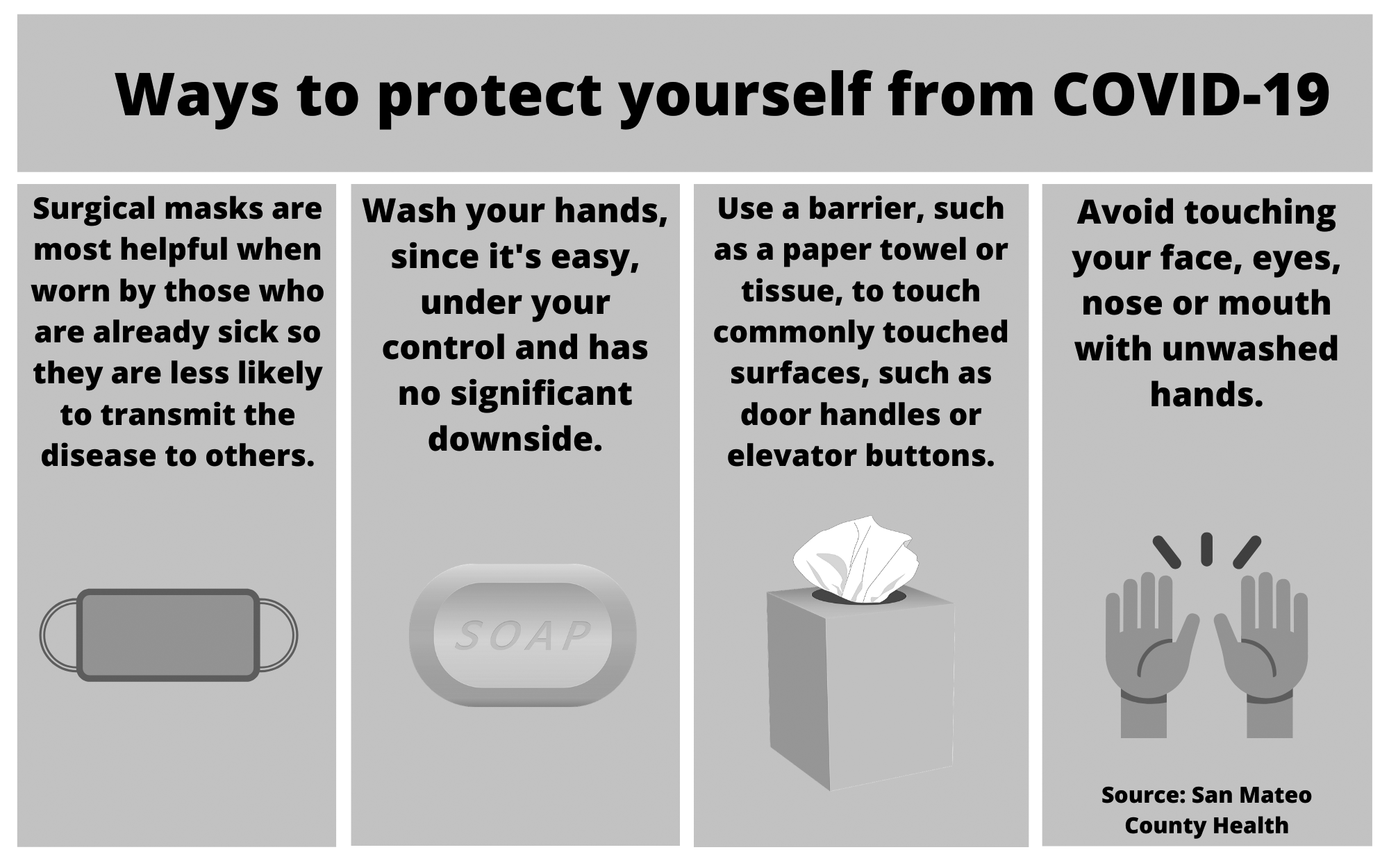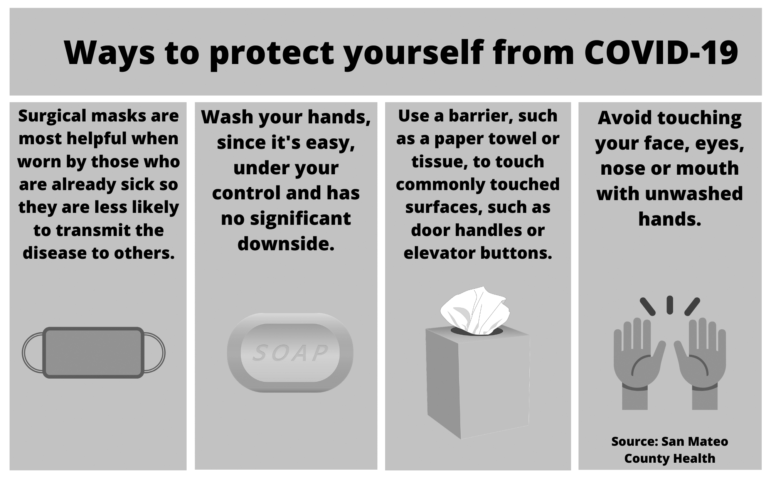
Coronavirus, also known as COVID-19, broke out in China and has affected the Aragon community. School events have been canceled, U.S. stock valuations have declined and families have begun to stock up on necessities due to the virus. Multiple high schools such as Lowell, Serra and Palo Alto have shut down for a short period time as a safety precaution and will reopen on a week by week basis.
Sophomore Timothy Lee worries about the potential that the virus has for affecting his family’s safety, especially after canceling his annual travel plans.
“I usually travel back to China every year to visit the village my family grew up in, but my family had to cancel all our plane tickets to China this year due to the outbreak,” Lee said. “I could imagine that maybe some areas in California might go on lockdown. The worst thing that could disrupt my daily life would be if something happened to one of my family members.”
Some students also worry about how quickly the virus has spread after reaching the United States.
“It’s scary how fast this situation is escalating, especially in California,” said sophomore Nayeon Koo. “The best way for me to lower my chance of contracting the disease would be to wash my hands more frequently and stay away from noticeably sick people.”
School administrators have even begun preparing for the worst, in the event of necessary school foreclosures. Superintendent Kevin Skelly has sent an email to the San Mateo Union High School District explaining that he and other superintendents are coordinating with the San Mateo County Health Officer, Scott Morrow, to discuss and plan the certain measures that need to be taken to lower the rate of transmissions if schools become infected.

“At this time we have no plans for school closures, but if we should need to do this, our District, like other districts, is examining looking at what we can do so that learning is not placed on hold,” Skelly said in the email. “On all our school campuses, we continue to be vigilant in cleaning common areas such as bathrooms, water faucets, classrooms and cafeterias to minimize the spread of germs.”
Principal Patricia Kurtz has also canceled non-essential school events in order to combat the transmission of the virus.
“I sent a note out to the PTSA and I believe it’s put on Canvas. It means that night meetings have been canceled, including open house and booster meetings,” Kurtz said. “Athletics are continuing on, because they’re taking their direction from the CCS, which is the California Coast Section. And so at this point, they’re telling them to hold their events as scheduled.”
Some students like freshman Alana Kurebayashi have noticed the new implemented cleaning procedures, but realize that it will not be able to completely stop the transmission of COVID-19.
“I mean, it’s good that the schools are taking charge to disinfect everything, but the virus is going to spread. Washing your hands and spraying the school with Clorox isn’t going to stop the virus —it’s only going to slow it down,” Kurebayashi said. “These changes don’t really affect me, other than the fact that the Clorox fog is making all the surfaces oily, which is a little bit annoying.”
Kurebayashi’s thoughts also align with what researchers are currently studying: COVID-19’s ability to spread by airborne transmission. Unfortunately, not much can be done by schools to prevent that mode of transmission. However, the World Health Organization has reported that it is most likely not a major source of transmission.
“I’d argue that at the rate the virus is spreading, it is an emergency. I find there to be considerable cause for concern due to predictions, such as those from a professor of epidemiology at Harvard, who mentions a possibility of infecting 40-70% of the world population, and comparisons made to the Spanish Flu,” said sophomore Tristan Liu. “Disruptions to our daily lives are beginning to occur. I’ve stopped going out for dinner and shopping. I feel there is a sizable chance of schools closing in the near future.
As of March 9, there have been 130 confirmed cases of COVID-19 in California, with 80 in the Bay Area, and two in San Mateo County. The declared state of emergency has also been causing panic as families stock up and shortages on items such as rice, hand sanitizer, and toilet paper emerge.
“Although I don’t want to judge anyone for their concerns on this unknown virus, I do think that the shortages are partly an overreaction caused by a lack of information. I was shocked that Costco didn’t have any rice, spam or water left,” Koo said. “I do wonder what events will come to unfold in the coming weeks as this virus spreads and the panic increases.”
In lieu of all the alarm that COVID-19 has caused, it is also worth noting the increasing trend of racial discrimination and profiling amid the Asian race.
While many haven’t witnessed that racism, some students, like senior Jenny Liu, do acknowledge how racism is on the rise due to the COVID-19 outbreak.
“I have not seen such things around me but I have heard about Chinese people getting bullied because of the outbreak,” Liu said. “I remember my brother showed me a video recently about a college girl getting kicked and stepped on because she is Chinese.”
Jenny Liu’s relative, Junda Huang, explains how the Coronavirus has affected China.
“After the outbreak, people are required to wear face masks to enter any supermarkets, or public areas. For people who live in an apartment building, IDs are checked at the gate, and the police check your temperature before they let you in,” Huang said. “It is very inconvenient but having those restrictions is the best way to protect the community from the rapid spread of the virus.”
There are some government measures students disagree with. For example, some dislike how President Trump has assigned Vice President Pence to oversee the U.S. COVID-19 efforts due to his poor track record with outbreak management.
“The appointment putting Mike Pence in charge of this crisis, in light of his poor response to an HIV outbreak when he was governor of Indiana, doesn’t give me great confidence in the ability of the US to respond,” said sophomore Tristan Liu. “The inability of the U.S. to successfully perform widespread testing for COVID-19 and Trump’s misleading statements also make me uneasy with the handling of the situation.”
Something that started out as a localized disease in a rural province of China is on the edge of becoming a global pandemic, where the effects would shape everything from the economy to the interactions within communities. Companies across the world work to find a vaccine for COVID-19.
